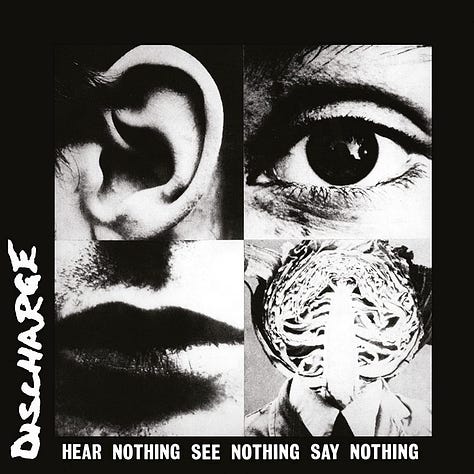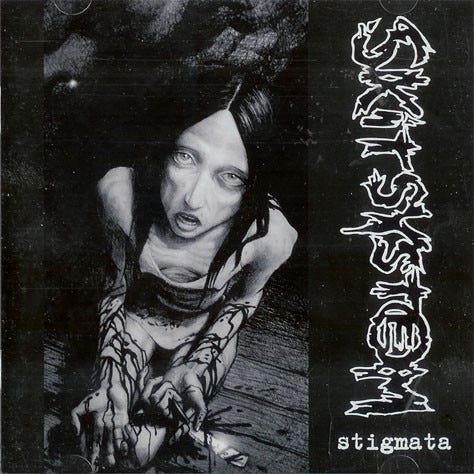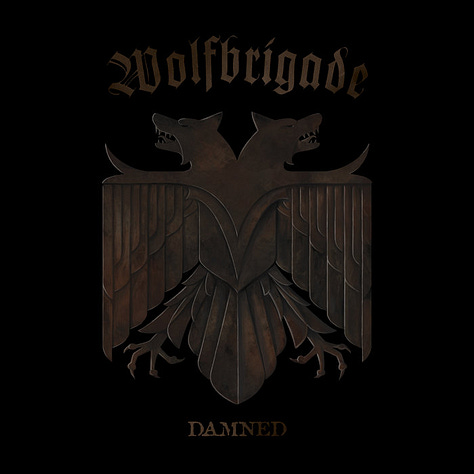Interview #4: Inferna
Freak City's finest (and crustiest) punks talk with me about their recent split EP, first official tour, and who should’ve been in Dimebag’s place.
Two short days before the Tulsa kick-off show for their first official tour out of state, I was able to chat with the folks in both Inferna and Shaka, two insanely talented and hardworking DIY punk bands out of OKC (affectionately nicknamed ‘Freak City’). While I was talking with Inferna, the Shaka gang (along with Hellray for most of this interview) were just off-camera, making buttons for the tour.
Zach (far-left), Hellray (ground), Corey (mid), and Jake (second to right) with the rest of the touring gang.
Line Up:
(Z)ach - bass/vox
(H)ilary ‘Hellray’ - vox
(C)orey - drums
(J)ake - guitar
You all are founding members - how did you all meet?
J: Zach and I have known each other since I was in, like, kindergarten I think - and I realized, “You’re the same Zach who used to live across the street from me!”
Z: That’s right! We’ve pretty much known each other all our lives.
C: I met them both in high school, became really good friends with Jake, went to shows, and knew Zach through going to shows. Eventually, we all just started getting together more and they called me up one day and asked me if I wanted to do Inferna.
J: I met Hilary through playing D&D.
Any campaigns going on?
C: I’m in a campaign right now with some internet friends, yeah.
J: I was in two campaigns until last week, we finished up a Dune campaign that a friend of mine made - it was supposed to be a one-shot, one-night thing, but you know how that goes.
[Several minutes of us all talking about D&D.]
This is your first official tour out of Oklahoma, correct?
Z: We were originally supposed to go on our very first tour the second week of March 2020 - obviously some stuff got in the way of that (laughs). We’ve traveled out to Colorado, New Mexico, and Texas to play with some friends, but this is our first tour in earnest!
Back in July, you all put out a split with a band called Intersect. How did that come together?
Z: The very first time we went down to play in ATX, our friend Hunter who is in a band down there called Scan put us on a show at the Yellow Jacket Social Club and it was a great time. We ended up playing with Intersect, who we did not know very well at the time. But we met them and immediately hit it off because a lot of what drives them to be a band is a lot of restorative justice programs and community accountability. We were hanging out after the show, standing around the merch booth, having beers with them and they asked us, “You guys like reggaeton?” (laughs) Like, “Yeah.” So, we dropped in at a black metal show and went and stayed at their house and listened to reggaeton until 5:00 a.m.
J: After we talked about Pantera for about two hours.
Z: There was a huge Pantera debate that is NOT worth getting into right now, but it should’ve been Phil.
C: Shoulda been Phil.
Z: (laughs) We love that band to death, love those people. Coming out of the pandemic, we were ready to get some material out and we just absolutely wanted to do this thing with Intersect. Carlos (drums in Intersect) pressed all the tapes and we made it happen. Mastering was done by our friend Austin who plays in a band called Victim of Fire up in Denver, another great crust band. The recording process I always hate because you have to listen to your songs over and over and over again.
C: And sometimes you have to do multiple takes and you're just pissed off at each other.
Z: When you’re a little kid playing guitar in your room, you always picture yourself on stage playing in front of people. You never picture yourself on a couch somewhere playing the same fucking riff for four hours. (laughs) That is the reality.
Where’d you guys record the split?
Z: We recorded it in the wrestling capital of the world.
C: Perry. Oklahoma.
Z: Yeah, in an old automobile dealership with our friend Danny Felton. He did a killer job - if you need a punk record made or otherwise, you should contact Danny Felton. Our buddy, Alex, also helped us produce the record. Alex plays in a band called Primal Brain (who played with Inferna and Shaka at Barkingham).
What are you all consuming media-wise when you go to make music?
J: I’m historically a metalhead and got into crust because of our dear friend, Zach. It started with Skitsystem and Wolfbrigade, a lot of Scandinavian - specifically Swedish - crust bands that really blend that line between metal and punk, which is very appealing to me. When I’m trying to write, I’m thinking of those bands; Skitsystem and Ursut and things like that.
C: I’m also historically a metalhead, especially fast metal, so I’ve always been really into black metal. You can tell in the music, I add a lot of bm-y blast beats and stuff like that. I love it and it’s really easy to integrate.
Z: For me, there’s elements of all that. I think that’s why I wanted to talk to the people that I did when we set out to start Inferna. Me and Jake bond over a lot of Scandi hardcore and crust, but then me and Corey also really like some knucklehead hardcore sometimes. Me and Hilary come from a very Punk background - like British street punk and Oi! Growing up in the American street punk scene and getting exposed to lots of different punk at that time in the early 00s. So, basically what we all want to fuck with is what everybody else is fucking with - the cool thing about our project is that it has driven us all to get into each other’s heads a little bit more about what we like. “Okay, what is your taste? What is it that you [C] love about black metal? What is it that WE love about black metal? And what is it that you [J] and I love about early death metal? With me and Hilary, it's like UK82 stuff - Discharge and Partisans and stuff like that. For me, it’s really refreshing being in a band and sharing all of these common influences with each other that may otherwise fall flat.



How did you all find the DIY scene?
H: My first introduction to punk was probably when I was like 10 or 11 and somebody gave me Let Go by Avril Lavigne - super cool, I know. But I was like, “Oh my god, girls can be like this? Like she’s got an attitude and the baggy pants, that’s so cool!” My sister is into all sorts of alternative music, and she gave me the Warped Tour ‘03 comp. The Casualties are on there and Tsunami Bomb and a few bands like that. Also, Myspace because I came from a small town. There wasn’t a music scene there at all. I had three CDs and internet access sometimes because we couldn’t be on the computer and phone at the same time. When I was 17 or so, I went to a party and saw some actual street punks and thought, “Holy shit, you can do this in real life? This is crazy!” And it pretty much destroyed my entire life.
Z: Myspace.com.
C: I found it from a former friend back in high school who was always inviting me to punk shows and I was like 14, so for a while, my parents were like, “No, you can’t go to those shows, we know what happens at those shows.” But eventually, they started letting me go to them and I loved them. It’s a lot of those street punk and Oi! shows that Zach was also brought up on.
Z: I feel like OKC especially - in a way that more major metro cities and coastal cities, there is more of it going on but it can feel harder to be involved, if that makes sense - in OKC it’s very easy once you come and engage. Say you go to a hardcore show, it’s very easy to meet people and network and kinda find your specific niche of music that you want to do, and there are people for all of that! For Hardcore, hardcore punk, pogo-punk, for what we’re doing - there’s people here in the middle of the country kind of excited about everything right now and I think it’s more accessible now than it has been historically.
J: Corey and I were roommates a few years ago and I asked if I could tag along to a show with him - and it was the last day of the first Everything Is Not Okay fest. That was my first DIY punk show, it was sick!
What would you all attribute to the rise in peoples’ general interest in hardcore and the DIY scene at large?
C: I think people make a lot of friends who maybe don’t listen to that kind of music or don’t know about it, and they’re just like, “Hey, here’s this thing I’m going to - you wanna come?” And it just turns into a chain. Some people like it and some people don’t, and those friends will bring friends. I know we just got a huge new wave of younger kids a year or two ago, I think that’s kinda how it started. One of the bands here brought a lot of their high school friends through, and everyone ended up loving it.
J: It’s all thanks to Shaka. (laughs)
C: Yeah, everything is owed to Shaka.
Z: I think a lot of it is that people want to go out and do things that we maybe took for granted a little more pre-pandemic. And not to be negative, I appreciate the space that punk and hardcore provide - I grew up in that and am super grateful for that - I think a lot of it points to a lack of third spaces for younger people that are not church-related or state-related or an after school sport or something. For me, this is a thing that really resonates with me and I’m here with people that, not to be dramatic, have nowhere else to go. You build a common friendship out of that and you fight for each other out of that and you build a lot of love and a lot of community out of that. For better or worse, punk is something that people can participate in and resonate with. It’s had a great snowball effect post-COVID and I think that’s awesome. I would say that Shaka definitely saved punk for everyone.








Finally checked this band out after your multiple articles about them. This shit rocks. Thanks for putting me on.